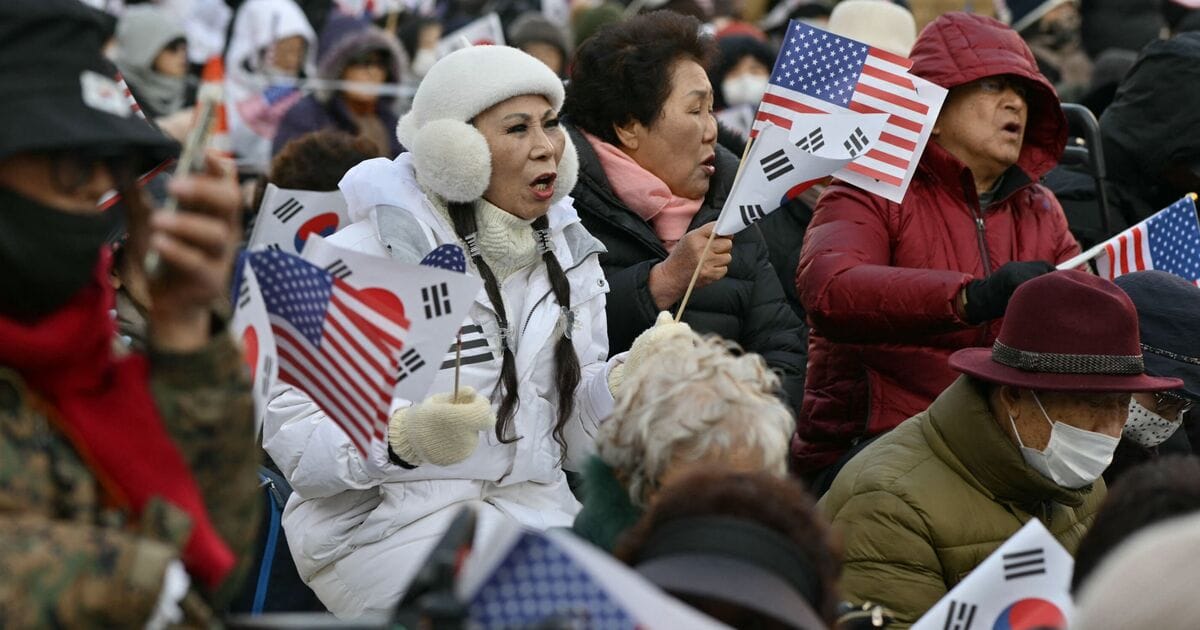
People wave South Korea and US flags as they take part in a rally in support of President Yoon Seok. (Image: AFP via Getty Images)
South Korea’s opposition parties have filed a motion to impeach President Yoon Suk Yeol, accusing him of violating the constitution with yesterday’s abrupt and highly controversial declaration of martial law.
The move comes just hours after Yoon lifted the six-hour decree, which saw troops encircle parliament before lawmakers overruled him.
Impeachment requires the backing of two-thirds of parliament – 200 out of 300 members – and a minimum of six Constitutional Court justices. The motion was submitted jointly by the Democratic Party and five smaller opposition groups and could be put to a vote as early as Friday.
Yoon’s government is in turmoil, with senior advisers and secretaries offering collective resignations and Defence Minister Kim Yong Hyun facing calls to step down.
Democratic Party floor leader Park Chan-dae said Yoon needed to be investigated immediately for rebellion, declaring: “This was a grave act of defiance against our constitution.”
READ MORE: ‘Cracks begin to show’ in EU as Macron’s French government faces collapse

People gathered in front of the National Assembly Building. (Image: Anadolu via Getty Images)
On Tuesday night, Yoon declared martial law, citing the need to eliminate “anti-state forces” after struggles with the opposition-dominated parliament.
The law was lifted by 4.30am this morning, local time, after the National Assembly voted 190-0 to override him. Mr Han Dong-hun, leader of Yoon’s ruling People Power Party, joined the criticism, calling the move “unconstitutional” and also urging Yoon to fire his defence minister.
Mr Yoon had invoked South Korea’s martial law provisions, which were last used in the 1980s, to station troops around parliament and suspend its activities.
Opposition leader Lee Jae-Myung live-streamed himself climbing the parliament’s walls to enter the chamber while security forces, armed and supported by military helicopters, blocked some lawmakers. Despite the presence of armed troops, the vote to nullify the decree passed without reported violence.

President Yoon Suk Yeol declared martial law yesterday (Image: Getty)
Mr Woo Won Shik, Speaker of the National Assembly, said: “Even with our unfortunate memories of military coups, our citizens have surely seen today the maturity of our military in avoiding escalation.”
The Democratic Party, holding a parliamentary majority, released a statement condemning Yoon’s actions as unconstitutional and demanding his resignation.
It warned: “This was a reckless violation of democratic norms and the rule of law.” The motion to impeach has been bolstered by discontent within Yoon’s own party; 18 People Power Party members voted to nullify his martial law declaration.
If the impeachment passes parliament, Yoon will lose his constitutional powers pending a Constitutional Court decision. Prime Minister Han Duck-soo would assume presidential duties temporarily. However, South Korea’s Constitutional Court currently lacks enough justices to handle the case due to retirements, forcing lawmakers to accelerate judicial appointments.

Han Duck-soo, South Korea’s Prime Minister, could end up becoming President (Image: Getty)
Mr Han Duck-soo urged patience, saying: “Cabinet members must continue fulfilling their duties during this challenging time.” Experts are nevertheless split on whether the court would ultimately back an impeachment.
The international community reacted with concern. The White House said it was “seriously concerned” by the developments and noted that Washington was not informed beforehand. The Pentagon reported no impact on the more than 27,000 US troops stationed in South Korea.
Despite the political chaos, life in Seoul appeared normal. Streets were busy, and tourists continued visiting landmarks.
Stephen Rowan, a visitor from Brisbane, said: “I’m not too concerned, but I hear they’re calling for the president to resign. If martial law had stayed, I’d have been worried.”

The Korean stock market dipped after Yoon’s announcement (Image: Getty)
South Korean President declares emergency martial law over opposition
Opposition to Yoon has been mounting due to his combative approach to parliament, strained relations with unions, and accusations of eroding democracy.
Critics likened the martial law decree to authoritarian measures from South Korea’s pre-democracy era.
Natalia Slavney of the Stimson Centre described the move as a “serious backslide” in democratic governance, adding, “South Korea has a history of overcoming such crises through mass protests and impeachments.”
Yoon’s opponents compared his situation to that of former President Park Geun-hye, who was impeached and jailed in 2017 for corruption. Calls for Yoon’s resignation show no sign of fading as South Korea grapples with its most severe constitutional crisis in years.








